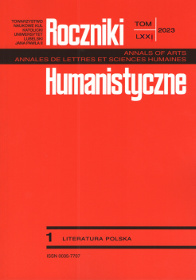Smok, Maja, Kali i Śmierć. Histoire croisée i omnipotentni narratorzy w twórczości Szczepana Twardocha
Dragon, Maya, Kali, and Death: Histoire Croisée and Omnipower Narrators in the Works of Szczepan Twardoch
Author(s): Natalia LemannSubject(s): Language and Literature Studies, Studies of Literature, Polish Literature
Published by: Towarzystwo Naukowe KUL & Katolicki Uniwersytet Lubelski Jana Pawła II
Keywords: entangled history; histoire croisée; multidirectional history; ethnicity; cultural memory; cultural identity; Buddhism; Hinduism; Upanishads; animal studies; speciesism
Summary/Abstract: The aim of this article is to analyse three novels by Szczepan Twardoch: Wieczny Grunwald. Powieść zza krańca czasów, Morfina, and Drach which seem particularly relevant for understanding this writer’s comprehension of the categories of ethnicity, historical memory, cultural identity, and history. I propose to identify these categories through Werner and Zimmeramann’s concept of ‘entangled history’ (histoire croisée) and Rothberg’s ‘multidirectional memory.’ In order to show the historical and ethnic entanglement, Twardoch uses the figure of a non-human, omniscient, omnipotent narrator in all three of the novels analysed. In relation to the abovementioned, I trace the philosophical concepts underlying the creation of the superior narrator and the figures of gods derived from the legacy of Eastern cultures (Buddhism, Lamaism, Hinduism, Taoism). In the novel Wieczny Grunwald, the concept of ethnic essentialism is ironically, if not absurdly, hyperbolised. The narrator is the bardic bastard Paszko. In Morfina, national identity becomes a work of choice and historical contingency, while the function of the overarching narrator is performed by the ‘black goddess,’ who is, I argue, the literary representation of the goddess Kali/Maya. In Drach, a change of perspective takes place, aiming to show the artificiality of any concept of the nation or human history. Twardoch equates human history with the fate of animals and invalidates the human conception of the causality and homogeneity of times and historical events and of the historical process. This is made possible by the figure of the narrator, who is the dragon Drach. For the purposes of interpreting Drach’s understanding of history, I draw on the Greek etymology of the word drakon – Gr. δράκων, gen. δράκοντος [drakōn, gen. drakontos] from the verb δέρκομαι [derkomai] (‘to see clearly’) – and the Taoist principle of wu wei.
Journal: Roczniki Humanistyczne
- Issue Year: 71/2023
- Issue No: 1
- Page Range: 9-28
- Page Count: 20
- Language: Polish

